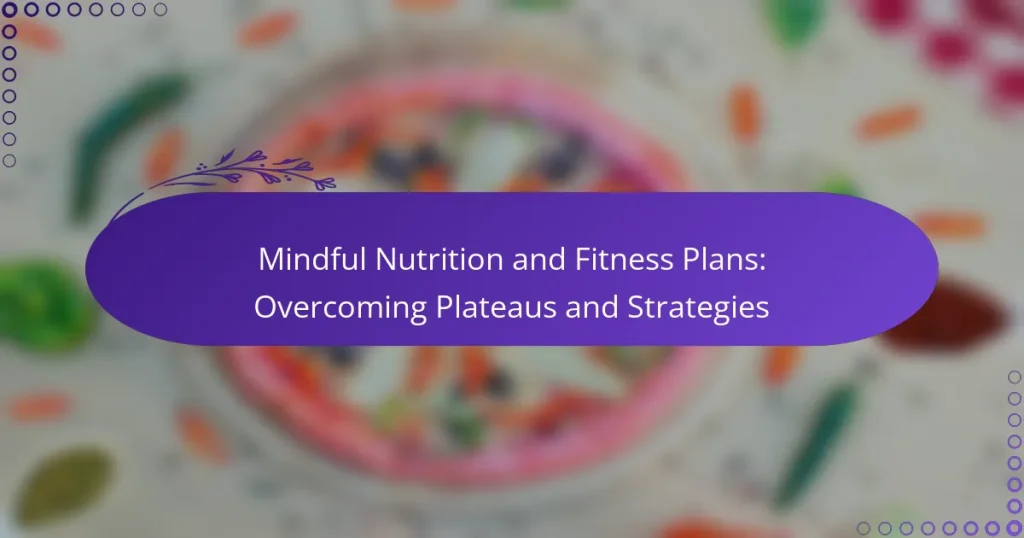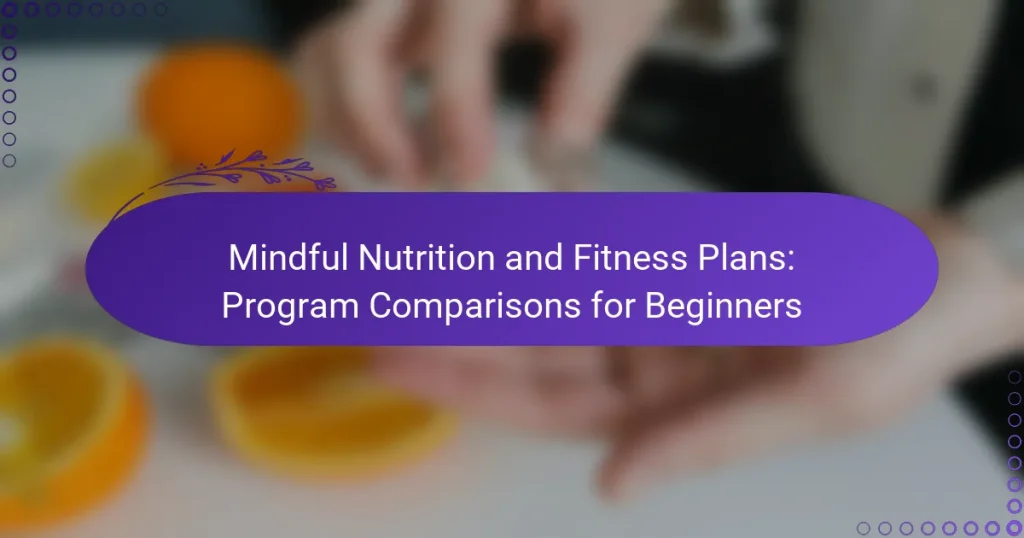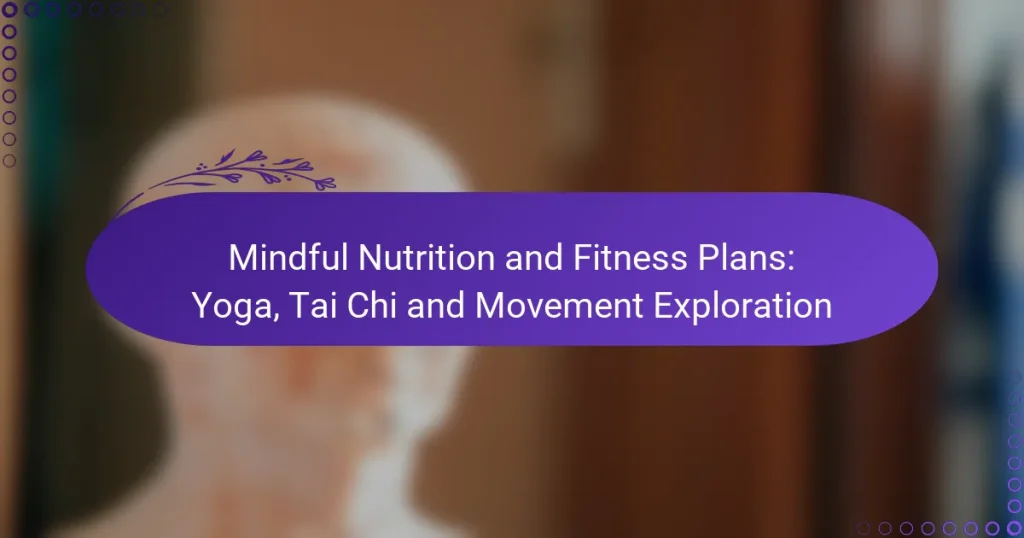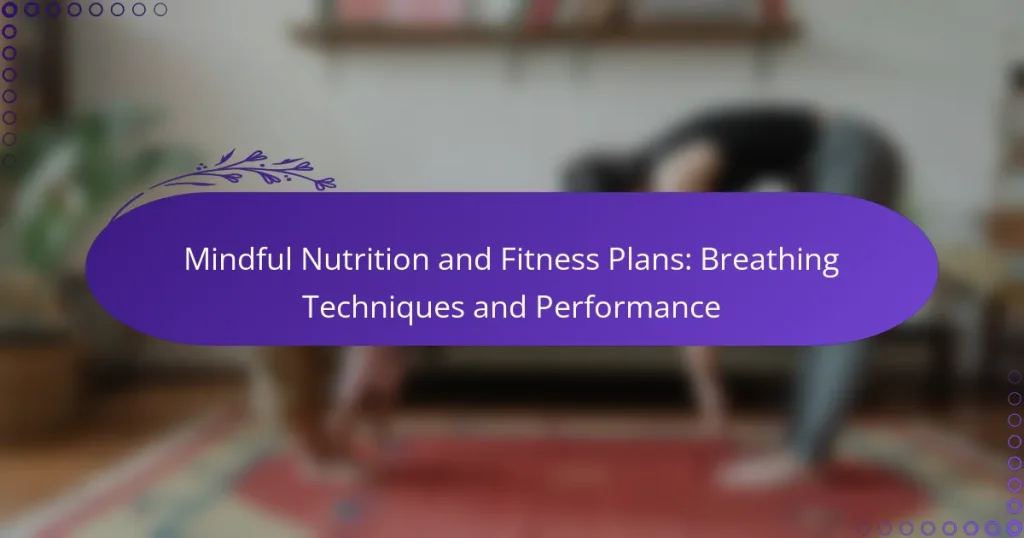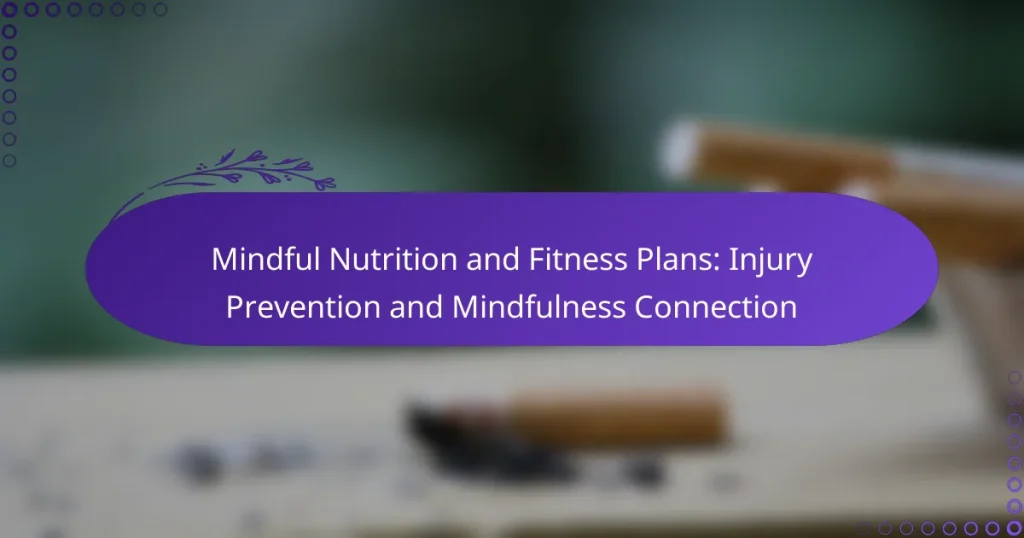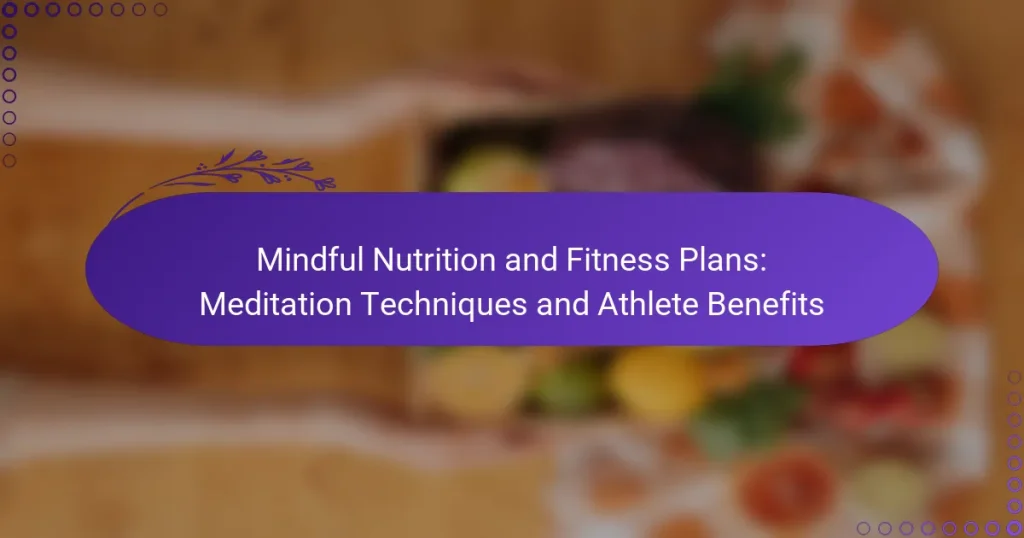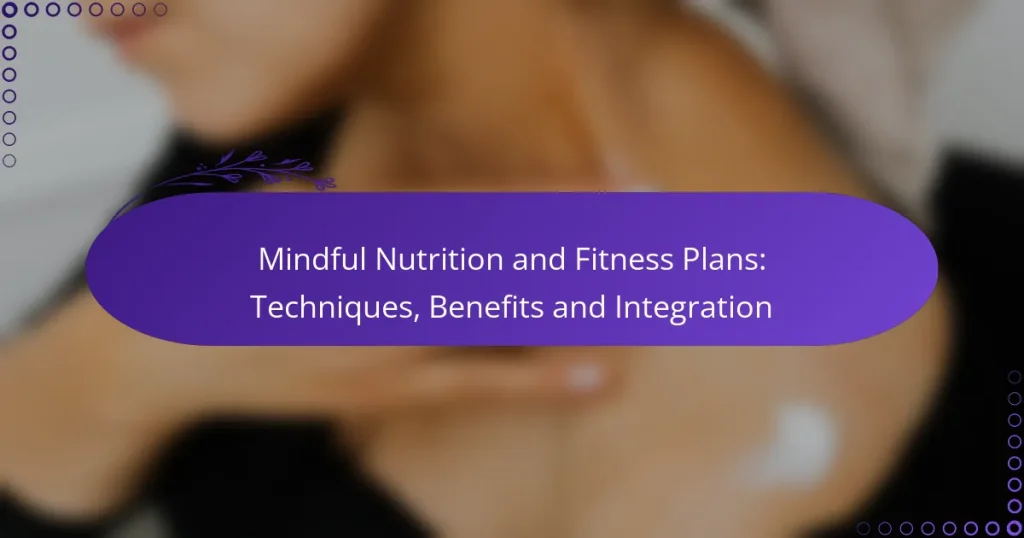Mindful nutrition and fitness plans emphasize the importance of being present and intentional in our food choices and physical activities. By integrating mindfulness into these aspects of life, individuals can cultivate a healthier relationship with food and enhance their overall well-being. In a bustling environment like New York, this approach helps navigate diverse options while staying committed to personal wellness goals.
Mindful Nutrition and Fitness Plans: Program Comparisons for Beginners
Mindful Nutrition and Fitness Plans: Yoga, Tai Chi and Movement Exploration
Mindful Nutrition and Fitness Plans: Breathing Techniques and Performance
Mindful Nutrition and Fitness Plans: Injury Prevention and Mindfulness Connection
Mindful Nutrition and Fitness Plans: Meditation Techniques and Athlete Benefits
Mindful Nutrition and Fitness Plans: Techniques, Benefits and Integration
How can mindfulness enhance nutrition and fitness in New York?
Mindfulness can significantly improve nutrition and fitness by fostering a deeper connection to food choices and physical activities. In New York, where diverse food options and fitness trends abound, being mindful helps individuals make healthier decisions and stay committed to their wellness goals.
Improved focus on food choices
Mindfulness encourages individuals to pay attention to their eating habits, leading to more conscious food choices. By slowing down and savoring each bite, New Yorkers can better recognize hunger cues and differentiate between emotional and physical hunger.
Practicing mindful eating can involve techniques such as eating without distractions, appreciating the flavors and textures of food, and reflecting on the nutritional value of meals. This approach can help individuals choose healthier options, especially in a city filled with fast food and convenience meals.
Increased awareness during workouts
Being mindful during workouts enhances the overall fitness experience by promoting a greater connection between mind and body. This awareness allows individuals to focus on their form, breathing, and the sensations of movement, which can lead to more effective workouts.
In New York’s bustling fitness scene, incorporating mindfulness can mean setting intentions before a workout, tuning into how the body feels during exercises, and adjusting routines based on personal energy levels. This practice can prevent injuries and improve performance over time.
Reduced stress and emotional eating
Mindfulness can help reduce stress and curb emotional eating by promoting awareness of triggers and responses. In a fast-paced environment like New York, stress can lead to unhealthy eating patterns, but mindfulness encourages individuals to pause and assess their feelings before reaching for food.
Techniques such as meditation, deep breathing, or journaling can help individuals manage stress more effectively. By recognizing emotional triggers, people can develop healthier coping mechanisms that do not involve food, leading to better overall well-being.
Enhanced motivation and commitment
Mindfulness fosters a positive mindset that can enhance motivation and commitment to fitness and nutrition goals. By focusing on the present moment and celebrating small achievements, individuals in New York can maintain enthusiasm for their wellness journey.
Setting realistic goals and practicing self-compassion are key components of this approach. Regularly reflecting on progress and adjusting goals as needed can help sustain motivation, making it easier to navigate the challenges of maintaining a healthy lifestyle in a vibrant city.
What are effective mindful nutrition strategies?
Effective mindful nutrition strategies focus on being present during meals, making intentional food choices, and tuning into your body’s signals. These approaches help foster a healthier relationship with food and promote overall well-being.
Mindful eating practices
Mindful eating involves paying full attention to the experience of eating, including the taste, texture, and aroma of food. This practice encourages individuals to slow down, savor each bite, and appreciate their meals, which can lead to improved digestion and satisfaction.
To implement mindful eating, try eliminating distractions during meals, such as screens or multitasking. Focus on the food in front of you, and consider using smaller plates to help control portion sizes while enhancing the enjoyment of each bite.
Meal planning with intention
Intentional meal planning involves creating a structured approach to meals that aligns with your nutritional goals and preferences. This strategy can help reduce impulsive eating and ensure a balanced intake of nutrients throughout the week.
Begin by setting aside time each week to plan your meals, considering factors like seasonal ingredients and personal cravings. Aim to include a variety of food groups, and prepare a shopping list to avoid impulse purchases at the store.
Listening to hunger cues
Listening to hunger cues means recognizing and responding to your body’s signals for hunger and fullness. This practice encourages individuals to eat when they are genuinely hungry and stop when they feel satisfied, rather than adhering to external schedules or emotional triggers.
To better understand your hunger cues, try keeping a food journal to track when you feel hungry and how different foods affect your satiety. This awareness can help you make more informed choices about when and what to eat, ultimately leading to healthier eating habits.
How to create a mindful fitness plan?
Creating a mindful fitness plan involves integrating awareness and intention into your exercise routine. Focus on being present during workouts, setting meaningful goals, and choosing activities that enhance your connection to the body and mind.
Incorporating meditation into workouts
Meditation can be seamlessly integrated into fitness routines to enhance mindfulness. Consider starting each session with a few minutes of focused breathing or visualization to center your thoughts and intentions.
During workouts, practice mindfulness by tuning into your body’s sensations, such as your heart rate and muscle tension. This awareness can deepen your connection to the exercise and improve your overall experience.
Setting mindful fitness goals
Mindful fitness goals should be specific, achievable, and aligned with your values. Instead of focusing solely on weight loss or performance metrics, consider goals that promote overall well-being, such as increasing energy levels or improving mood.
Use the SMART criteria—Specific, Measurable, Achievable, Relevant, Time-bound—to structure your goals. For instance, aim to practice yoga three times a week for relaxation rather than just aiming to lose a certain number of pounds.
Choosing activities that promote presence
Selecting activities that encourage mindfulness can significantly enhance your fitness journey. Practices like yoga, tai chi, or even mindful walking emphasize awareness and can help you stay present in the moment.
Consider activities that resonate with you personally, as enjoyment can enhance your commitment. Engaging in outdoor activities, such as hiking or cycling, can also foster a deeper connection with nature and promote a mindful state.
What are the benefits of combining mindfulness with fitness?
Combining mindfulness with fitness offers numerous advantages, including enhanced focus, improved emotional well-being, and better physical performance. By integrating mindfulness practices into your workout routine, you can cultivate a deeper connection to your body and its needs, leading to more effective and enjoyable fitness experiences.
Enhanced physical performance
Mindfulness can significantly boost physical performance by promoting greater awareness of body movements and breathing patterns. This heightened awareness allows individuals to fine-tune their techniques, leading to more efficient workouts and improved results. For instance, athletes who practice mindfulness report better coordination and stamina during their activities.
To incorporate mindfulness into your fitness routine, consider focusing on your breath during exercises or engaging in activities like yoga or tai chi, which emphasize body awareness. Aim for sessions that last at least 10-15 minutes to reap the benefits effectively.
Improved mental health
Integrating mindfulness into fitness routines can lead to substantial improvements in mental health, including reduced stress and anxiety levels. Mindful practices help individuals develop a more positive mindset, allowing them to face challenges with resilience. Studies suggest that regular mindfulness practice can lead to a decrease in symptoms of depression and anxiety.
To enhance mental well-being, set aside time for mindfulness meditation before or after workouts. Even short sessions of 5-10 minutes can help center your thoughts and promote a sense of calm, making your fitness journey more enjoyable.
Better recovery and injury prevention
Mindfulness plays a crucial role in recovery and injury prevention by encouraging individuals to listen to their bodies and recognize signs of fatigue or strain. By being more attuned to physical sensations, you can adjust your workouts accordingly, reducing the risk of overtraining and injuries. This approach promotes a more sustainable fitness regimen.
Incorporate mindfulness techniques such as body scans or gentle stretching to enhance recovery. Aim for at least one recovery day per week where you focus on restorative practices, allowing your body to heal and recharge effectively.
What tools can support mindful nutrition and fitness?
Various tools can enhance mindful nutrition and fitness by promoting awareness and intentionality in your choices. These tools include apps for meditation, mindfulness practices, and journals for tracking your nutrition and fitness activities.
Apps for meditation and mindfulness
Apps designed for meditation and mindfulness can help you cultivate a more present and aware mindset, which is essential for mindful nutrition and fitness. Popular options include Headspace, Calm, and Insight Timer, each offering guided meditations, breathing exercises, and mindfulness reminders.
When selecting an app, consider features like user interface, variety of content, and whether it includes progress tracking. Many apps offer free trials, allowing you to explore their offerings before committing to a subscription.
Journals for tracking nutrition and fitness
Journals specifically designed for tracking nutrition and fitness can help you maintain awareness of your eating habits and exercise routines. These journals often include sections for logging meals, workouts, and reflections on your progress, which can enhance accountability and motivation.
When choosing a journal, look for one that suits your style, whether it’s a physical notebook or a digital app. Some popular options include MyFitnessPal for digital tracking and Bullet Journals for a customizable approach. Regularly reviewing your entries can provide insights into patterns and areas for improvement.
